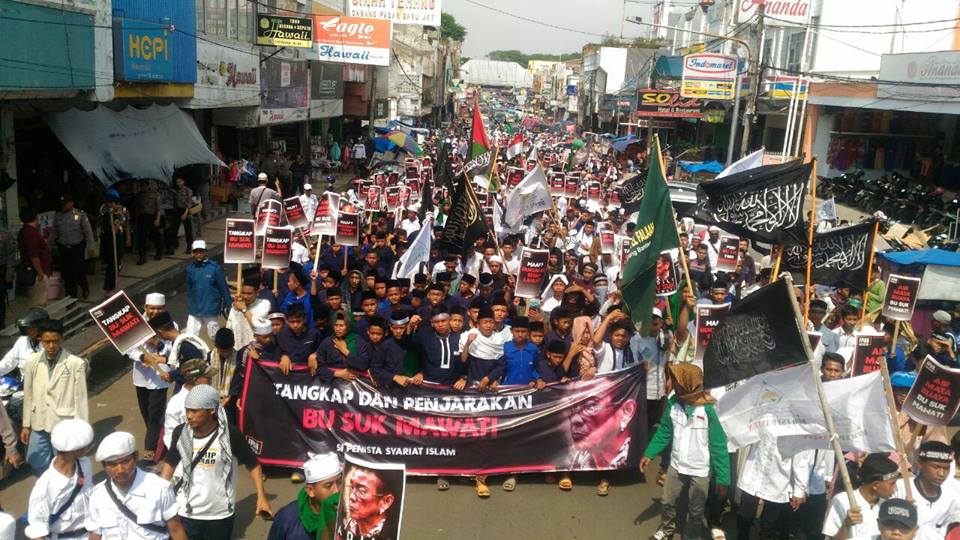The controversy over a poem read last week by Sukmawati Soekarnoputri, daughter of Indonesia’s first president and founding father Soekarno, has now become a divisive issue among many of Indonesia’s most prominent Islamic organizations.
After Sukmawati tearfully read an apology statement on Wednesday asking for forgiveness from any of the country’s Muslims who were offended by her poem, Ibu Indonesia, many influential figures called on their fellow Muslims to forgive her, including Cak Imin, the deputy chairman of the People’s Consultative Assembly (MPR), PP Muhammadiyah general secretary Abdul Mu’ti, and even Kapitra Ampera, lawyer to fugitive Islamic Defenders Front (FPI) leader Rizieq Shihab and advocacy head for GNPF Ulama (the National Movement to Safeguard Ulema’s Fatwa – the main organizer of the mass protests against former Jakarta Governor Basuki “Ahok” Tjahaja Purnama). There were also calls to rescind the many blasphemy complaints against Sukmawati that have been submitted to the police.
Perhaps the most prominent and influential Islamic leader to call for Sukmawati’s forgiveness was Mar’uf Amin, the chairman of the Indonesian Ulema Council (MUI), the country’s senior Islamic clerical body.
“She really did not have any intention of insulting Islam, so she apologized and today we met her for her apology to be conveyed to the audience, especially Muslims,” Ma’ruf said after meeting with Sukmawati yesterday, as quoted by Merdeka.
The MUI chairman urged the country’s Muslims to forgive Sukmawati so that the matter could be resolved peacefully.
However, some are not so quick to forgive. Today in Jakarta, a hardliner group called Persaudaraan Alumni 212 (made up of “alumni” of the December 2 anti-Ahok protests) went ahead with plans to conduct a protest against Sukmawati for her alleged blasphemy. Some 6,000 police officers were assigned to secure the protest and around 1,000 demonstrators took part based on some media estimates.
When asked about Ma’ruf’s request that Sukmawati be forgiven, Persaudaraan Alumni 212 spokeman and FPI Jakarta general secretary Novel Bamukmin (of “Fitsa Hats” infamy) bluntly rejected the idea and criticized the MUI chairman for even suggesting the idea that Muslims could forgive blasphemy.
“If religion is insulted, then it is God’s right, we have no right to give forgiveness to Sukmawati because it is not something people can do,” Novel told CNN Indonesia today.
Novel insisted he would not withdraw the police report filed against Sukmawati by Persaudaraan Alumni 212, saying that no criminal act could be written off with an apology.
On top of that, Novel criticized MUI head Ma’ruf himself, saying that MUI had not defended Rizieq Shihab or other Islamist “activists” who were being investigated by the government.
“Even as he defends the blasphemer, he encourages the people to forgive and pull their (police) reports,” Novel said.
It should be noted that 2016’s anti-Ahok protests were theologically justified by Ma’ruf and MUI issuing a fatwa declaring that Ahok had committed blasphemy against Islam, allowing organizers to argue that they were simply defending Islam and MUI’s fatwa.
For Novel and Persaudaraan Alumni 212 to directly criticize Ma’ruf and MUI is somewhat shocking (it doesn’t seem impossible that somebody might report him for “insulting the ulema”) but it also represents a larger ongoing ideological fragmentation between Indonesia’s conservative and hardline Islamic organizations, which were largely united against Ahok previously.
Following Ahok’s electoral defeat, many political analysts worried that hardliner groups would continue to seek greater political influence over the country, but infighting within the various groups (Persaudaraan Alumni 212, for example, was previously called Presidium Alumni 212 until a recent schismatic event) have led many to doubt how much influence they’ll actually have on the upcoming regional elections or next year’s presidential election.





